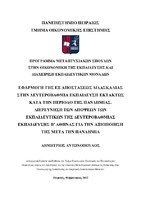Εφαρμογή της εξ αποστάσεως διδασκαλίας στην δευτεροβάθμια εκπαίδευση εκτάκτως κατά την περίοδο της πανδημίας. Διερεύνηση των απόψεων των εκπαιδευτικών της δευτεροβάθμιας εκπαίδευσης Β’ Αθήνας για την αξιοποίησή της μετά την πανδημία
Implementation of distance learning in secondary education as a matter of urgency during the pandemic. Investigation of the views of secondary education teachers of B’ Athens for its utilization after the pandemic

Προβολή/
Λέξεις κλειδιά
Σχολική εξ αποστάσεως διδασκαλία ; Ψηφιακή διδασκαλία έκτακτης ανάγκης ; Εξ αποστάσεως εκπαίδευση ; Ψηφιακή εκπαίδευση ; Υβριδική - μικτή μάθηση ; Δευτεροβάθμια εκπαίδευση ; η-τάξη ; E-me ; COVID-19Περίληψη
Το κλείσιμο των σχολείων και η επακόλουθη εφαρμογή της ψηφιακής εξ αποστάσεως διδασκαλίας ήταν μία από τις κύριες στρατηγικές για τον περιορισμό της πανδημίας Covid-19. Στην ιδέα να επιστρέψουμε, στη δια ζώσης διδασκαλία ευθυγραμμίζονται, με λιγότερο ή περισσότερο ενθουσιασμό, στο σύνολο σχεδόν όλοι οι οργανωσιακοί συντελεστές του Εκπαιδευτικού Συστήματος, πολιτικοί, παιδαγωγοί, εκπαιδευτικοί, διευθυντές σχολικών μονάδων, Γονείς και Κηδεμόνες. Το μανιχαϊστικό δίλημμα της δια ζώσης διδασκαλίας ως καλή και της ψηφιακής διδασκαλίας ενός αναγκαίου κακού μόνο κατά τη διάρκεια της πανδημίας, είναι μια ιδεολογική αναγωγή. Η μεγάλη χρονική διάρκεια της τρέχουσας πανδημίας, μας επιτρέπει να πειραματιστούμε με την ενσωμάτωση και τον εμπλουτισμό της δια ζώσης διδασκαλίας στην τάξη με τα εργαλεία και την εμπειρία από την χρήση της ψηφιακής διδασκαλίας.
Η προοδευτική επιστροφή στη «νέα κανονικότητα» θα πρέπει να βασίζεται στη μικτή διδασκαλία και την εγκατάλειψη οριστικά των παρωχημένων πρακτικών της μετωπικής και μεταδοτικής διδασκαλίας. Πιο συγκεκριμένα, η παρούσα εργασία διερευνά τις απόψεις των εκπαιδευτικών και τις προϋποθέσεις υλοποίησης μιας μικτής διδασκαλίας (blended learning) και μετά την πανδημία, όπου οι δύο μορφές μάθησης θα μπορούσαν να εναλλάσσονται με διαχρονικό και κυρίως μη συγχρονισμένο τρόπο σε περιβάλλοντα εικονικής μάθησης όπως E-class και Moodle και όχι μόνο BigBlueButton, Webex, κ.λπ. Η δια ζώσης διδασκαλία, υβριδοποιημένη από την τεχνολογία, μπορεί να χρησιμοποιείται για να αξιοποιήσει στο έπακρο την ενσυναίσθηση και την κοινωνικότητα για να θέσει τα θεωρητικά θεμέλια που θα συνεχιστούν διαδικτυακά σε μια κυρίως ασύγχρονη μορφή εξ αποστάσεως συμπληρωματικής διδασκαλίας.
Επιπλέον, η κατανόηση της εμπειρίας που βιώνουν οι εκπαιδευτικοί στα σχολεία της Β’ Αθήνας που αν και επισημαίνουν σημαντικές ομοιότητες μεταξύ της τοπικής και της εθνικής εμπειρίας, αναδεικνύουν τόσο την ανάγκη περαιτέρω έρευνας για την ανάδειξη καλών πρακτικών, όσο και τη σημασία μαθημάτων κατάρτισης και έρευνας με στόχο την ανάπτυξη της επαγγελματικής ταυτότητας των εκπαιδευτικών.
Οι εκπαιδευτικοί και τα σχολεία που συμμετείχαν σε καινοτόμα προγράμματα έχουν τη δυνατότητα να χρησιμοποιούν την ψηφιακή τεχνολογία και να εμπλουτίσουν την μετωπική διδασκαλία με online ψηφιακές εργαστηριακές δραστηριότητες. Τα αποτελέσματα της έρευνας έδειξαν ότι η εξ αποστάσεως μάθηση απαιτεί ένα διαφορετικό σχεδιασμό και προσφέρει πολλές νέες ευκαιρίες.


